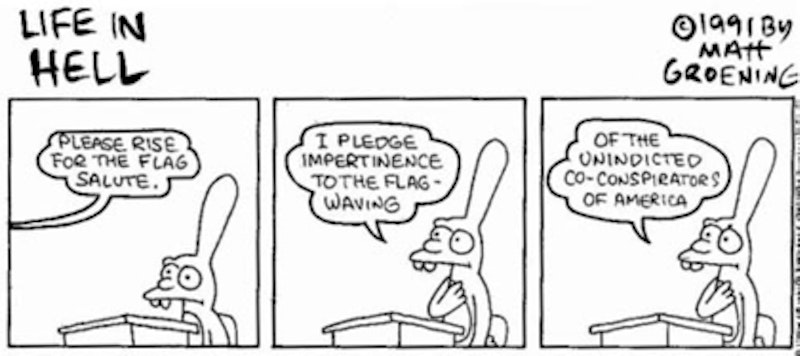More than a decade before he struck the motherlode with The Simpsons, Matt Groening established his pop-cultural bona fides with the syndicated comic strip “Life in Hell,” which now appears in countless weekly newspapers, as well as some dailies, throughout the nation. Initially self-published and sold as an underground comic book in 1977, “Life in Hell” made the transition to a strip format the next year in plucky Wet magazine; for that first foray into the commercial market, Groening produced “Forbidden Words,” a compendium of overworked/overused words and phrases that has since become an annual “Life in Hell” tradition, the linguistic equivalent of Mr. Blackwell’s 10 Worst Dressed List.
Something of a public service, it documents the passing of a word or phrase from merely annoying to officially clichéd. The 1997 “Forbidden Words,” for example, drove a stake through the hearts of “been there/done that,” “empowerment,” “don’t go there,” and “no-brainer,” among others. Not that any of them actually died. Despite Groening’s best efforts as language cop, each of those locutions, regrettably, remains a fixture in the American vernacular.
Maybe I’m just oversensitive, but it seems as if that vernacular has become increasingly populated by such irritants. Seldom does a day pass that I don’t read or hear a spokesperson for a business or a government agency accused of fraud, malfeasance, or general screwups routinely note that his/her employer “takes very seriously” the criticism leveled against it; or an attorney headed to court reflexively vow “to vigorously defend” his/her client.
In short, a paucity of imagination pervades public discourse, a situation exacerbated by lazy journalists and pre-programmed flacks in a superheated media universe. Born of a specific political, social, military, economic, or, especially, cultural phenomenon, words and phrases often become ubiquitous, and then, depending on their individual adaptability, either gradually disappear or permanently take up residence in the vernacular. Ones adaptable enough to be applied to multiple situations stick around (“push the envelope,” “outside the box,” “win-win situation”); others, tethered too tightly to a discrete source and with insufficient flexibility, hit the road (“voodoo economics,” “coalition of the willing,” “shock and awe”).
Hatched by the Pentagon in 2003 to describe its bombing strategy at the outset of the Iraq war, “shock and awe” immediately migrated into the mother tongue before fading away after a year, perhaps two at most. Now seldom uttered or written, “shock and awe,” despite its horrific origin, seems almost quaint. It came across as jarring when mentioned in a spring 2007 news item about D.C. madam Deborah Jeanne Palfrey, whose client list of Washington notables included Harlan K. Ullman, the Department of Defense consultant who coined “shock and awe.”
A similarly brief radioactive half-life characterized “where’s the beef?” Spawned in a 1984 TV commercial for Wendy’s fast-food restaurants, the phrase—mouthed by octogenarian actress Clara Peller to vilify the supposed skimpiness of burgers made by rivals—quickly metastasized, famously uttered that same year by former Vice President Walter Mondale to question the substance of policies advocated by Gary Hart, his then-principal opponent in the campaign to snag the Democratic Party’s nomination for President. These days, if you were to introduce “where’s the beef?” into a conversation, it likely would elicit bemused embarrassment from anyone over the age of 40 and stares of befuddlement from anyone younger.
This season’s presidential campaign has produced similar embraces of forbidden words—or words destined for forbiddeness. Just a month ago, on the eve of the North Carolina primary, Hillary Clinton delivered a sensational one-two combination when she told supporters in that state, “This primary election on Tuesday is a game-changer. This is going to make a huge difference in what happens going forward.”
“Going forward”—or its twin, “moving forward”—has been an odorless, colorless, meaningless staple of politicians and businesspeople for what seems an eternity, while “game-changer” has seeped into the mainstream more recently, buoyed by “Little Mo” (for “little momentum”), an enduring catchphrase from the 1980 presidential campaign.
Other forbidden words currently mucking up the language: “this is not your father's [insert noun here],” “low-hanging fruit,” “challenging environment,” and, the big kahuna, “perfect storm.” Bounding out of the 1997 book and 2000 film of the same name, perfect storms whirl and whip through our lives at an alarming rate, preceding both beneficial and tragic outcomes, usually the latter. (Apparently, nature abhors an imperfect storm, or, at the very least, our culture refuses to acknowledge publicly a less-than-perfect one.)
Unfortunately, “perfect storm” appears to have “Big Mo” (which pre-dated “Little Mo” in 1980) on its side, destined to join “too much on my plate,” “closure,” and “have a good one” as entrenched language vexations, having already surpassed its “tipping point.”
It Was a Dark and Perfectly Stormy Night
An envelope-pushing roundup of overused, tired phrases in our language. Sure to produce shock and awe, this is not your father's list of trite phrases.

